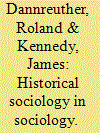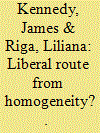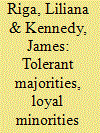| Srl | Item |
| 1 |
ID:
077005


|
|
|
|
|
| Publication |
2007.
|
| Summary/Abstract |
This article utilizes Will Kymlicka's (1995) distinction between "equality between groups" and "equality within groups" to assess the degree to which nationalism can be considered liberal. The substantive focus is on the pronouncements of two sets of nationalists in Scotland and Québec at the turn of the 20th century: the Young Scots' Society and the more loosely grouped Nationalistes. Both groups were nurtured in the "Liberal politics" of the era. While both nationalists exhibited a "liberal nationalism," their "liberal nationalisms" were differently expressed, suggesting the existence of "two types of liberal nationalism," in which the Young Scots and Nationalistes displayed the first dimension of Kymlicka's schema but differed on the second
|
|
|
|
|
|
|
|
|
|
|
|
|
|
|
|
| 2 |
ID:
077893


|
|
|
|
|
| Publication |
2007.
|
| Summary/Abstract |
While historical sociology (HS) has declined in the UK, its position in the United States is much more secure. This article analyses the divergent paths of HS in both the UK and the US in order to provide some lessons for international relations (IR) in both countries. The article argues that HS in the US has been more successful in defining its particular contribution - the pursuit of important, macro-oriented research. The main benefit that HS can bring to IR is the provision of this 'intellectual space' allied to an engagement with 'big issues'. The article traces such a contribution in three areas: the state, civil society and democratization; nationalism and ethnic conflict; and Islam and the Middle East. The article concludes by arguing that the adoption of HS may have the added benefit of transcending the exigencies of the present-day and the parochialism of Western and Eurocentric concerns found in much contemporary IR
|
|
|
|
|
|
|
|
|
|
|
|
|
|
|
|
| 3 |
ID:
121410


|
|
|
|
|
| Publication |
2013.
|
| Summary/Abstract |
This article explores how key US policymakers' understandings of nationalism contributed to core tensions in Bosnia's Dayton Peace Accords. Drawing on in-depth interviews with some of Dayton's key architects, our findings suggest that US elites drew on a cluster of entwined social knowledge claims about (ethnic) nationalism and the possibility of its liberal accommodation. US policymakers' social knowledge was anchored around two key liberal beliefs: a Millian acknowledgement that territorial homogeneity would facilitate political stability and liberal governability; and a countervailing normative desire to liberalize ethnic nationalisms through the imposition of liberal-legalist frameworks.
|
|
|
|
|
|
|
|
|
|
|
|
|
|
|
|
| 4 |
ID:
058514


|
|
|
| 5 |
ID:
089198


|
|
|
|
|
| Publication |
2009.
|
| Summary/Abstract |
The 1919 Versailles Peace Conference created new states in East Central Europe (ECE), but the imperfect implementation of the 'one nation, one state' formula resulted in more than twenty-five million 'unassimilable' minorities. With the introduction of majoritarian democracy, this gave rise to what we term 'ethnic reversals': 'formally dominant majorities' suffered status decline, while previously 'minoritised majorities' found new political powers. Accordingly, the 1919 Minorities Treaties sought to manage these 'ethnic reversals' by instituting a liberal minority rights regime that tried to create both 'tolerant majorities' and 'loyal minorities'. While the Treaties reflected the influences of Anglo-American and Anglo-American Jewish elites - the most notable voices of liberalism in an age of ethnic homogenisation - we suggest that in contexts of historical diversity with little institutionalised liberalism, 'ethnic reversals' raise issues that cannot be resolved within liberal conceptions of minority rights that rely solely or primarily on cultural protections.
|
|
|
|
|
|
|
|
|
|
|
|
|
|
|
|